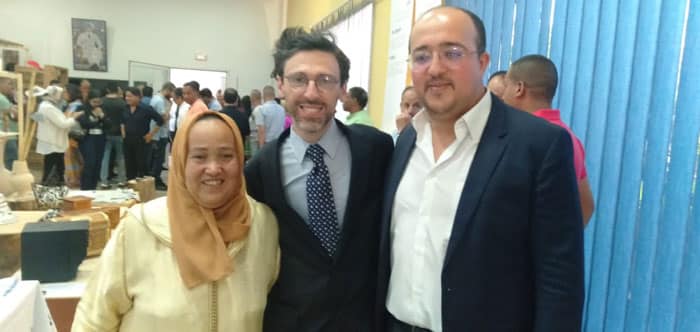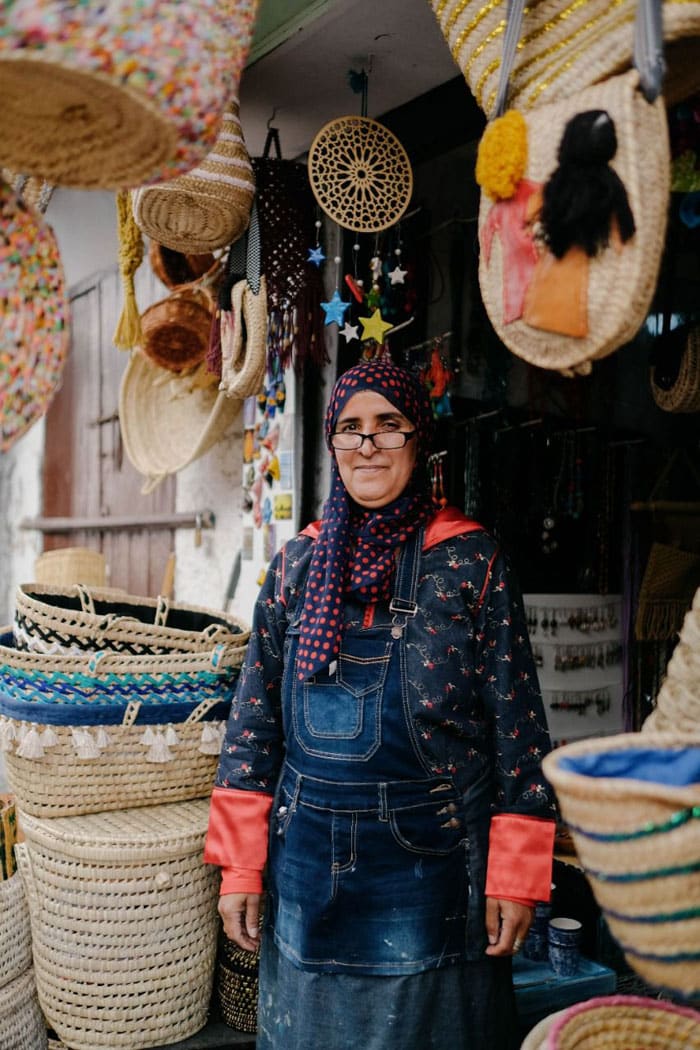 Judaica created by local Muslims on display at the Rebuilding Our Homes exhibit opening at the Mohammed V Foundation in Fez. (Courtesy/Rebuilding Our Homes)
Judaica created by local Muslims on display at the Rebuilding Our Homes exhibit opening at the Mohammed V Foundation in Fez. (Courtesy/Rebuilding Our Homes) To read more articles from The Media Line, click here.
Moroccans now living in the mellahs – historic urban neighborhoods in Moroccan cities that were once thriving Jewish quarters – do not know anything about the people who lived there before them. These neighborhoods later became small, mostly poor ghettos, with little to no connection to Jews today.
But a new program might change this. “Rebuilding Our Homes” is a multi-year US Agency for International Development-supported New Partnership Initiative of the American Sephardi Federation and Mimouna Association. It aims to revive the prosperous Jewish life in the historic urban areas in Fez, Essaouira and Rabat, by teaching their current residents about local history, and helping to make them part of the rich heritage of the place.
“We make the residents of these neighborhoods take part in preserving the place by letting them document and upload photos of old Jewish houses to our archive, and teaching them Hebrew,” Jason Guberman, executive director of the American Sephardi Federation, told The Media Line.
Guberman is one of the founders of the three-year project, which still has another 18 months to go.
“We wanted to establish a connection between youth and grownups in these neighborhoods and their own history – as well as to the rich Jewish heritage surrounding them,” he explained.
This is the reason for another workshop that has become part of the project: Judaica and traditional Jewish art.
Today, many of the residents of the mellahs make a living from creating Jewish artifacts and selling them to tourists. Mezuzas, Shabbat candlesticks and other traditional pieces of Judaica made by Muslims are filling the shops in the narrow alleys.
“I took a course in traditional Jewish industry, and how to mix it with local Moroccan art,” Hicham Essaidi, one of the artisans taking part in the project, told The Media Line. “We learned about what tools Jews use for their holidays, what’s important in religion and many other nuances.”
The course, he explains, was presented as part of a cooperation of the Mimouna Association, the American Sephardi Federation, USAID and the Mohammad V Foundation.
Essaidi said he is excited to meet the expected tourists to the neighborhood and expressed his hope that many Israelis will come to Morocco.

“We had to teach people not only the art, but also go deep into the meaning of each artifact,” El Mehdi Boudra, president of the Morocco-based Mimouna Association, told the Media Line. “These artifacts will be sold to Jewish and Israeli tourists, which we expect in big quantities starting next year,” he added.
Some 200,000 Israeli tourists are expected to visit Morocco next year. Israel and Morocco agreed to normalize relations in December 2020 as part of the Abraham Accords.
“There were only four Hebrew-speaking tour guides in the kingdom before we started the project. Now there are 200, and many more want to learn Hebrew. People are waiting for Jews to come visit, and they are looking forward to interacting with them,” Boudra said.
As to his own connection to Judaism, Boudra has a surprising answer.

“I’m a proud Muslim. Ethnically I’m Arab and Amazigh. But culturally I’m Moroccan, which means Jewish as well,” he said. “Morocco was home to the biggest Jewish community in the Muslim world for centuries. Judaism is an integral part of our culture as Moroccans, and we should take pride in that.”
Prior to the massive immigration of Moroccan Jews to Israel in the 1960s, there were nearly 250,000 Jews living in the kingdom, in several different cities.
“My mom came from Casablanca, where Jews and Muslims lived side by side, so I always heard stories about the Jewish community, without knowing them personally. The younger generation living in the mellahs, however, knows almost nothing about the rich Jewish heritage our country has,” said Boudra, whose association is one of several partners supporting the project.
Boudra said that the general public has a positive opinion about the Jews who lived in the mellahs.
“We surveyed what people here thought about Jews before we started the project, and discovered 85% of the population has a positive opinion about them,” he said. “That’s a high support rate, which was important for us to initiate the program.”
“We also tested what people think of the Abraham Accords and found out that about 93% of people are supportive of (Jews), mainly for economic reasons. It’s a good reason, but we wanted to encourage a connection to Jews and Israel that is deeper than just money. The two peoples were close, and could be as close once again,” he explained.
Rebuilding Our Homes, including the courses and workshops the program offers to locals, is expected to carry on for another year and a half. Boudra says it should be more than enough.
“Our goal was to give people the tools to develop their neighborhoods and make them welcoming for Jewish tourists, because the economic prosperity shouldn’t stay only at the high-class resorts and hotels,” he said. “But now it’s up to them. We hope the people living in the mellahs take these tools and go forward with them, making this a success story. And we are optimistic,” he said. “People are already starting to open kosher Moroccan restaurants and show more enthusiasm about Judaism. We hope this continues.”






















 More news and opinions than at a Shabbat dinner, right in your inbox.
More news and opinions than at a Shabbat dinner, right in your inbox.